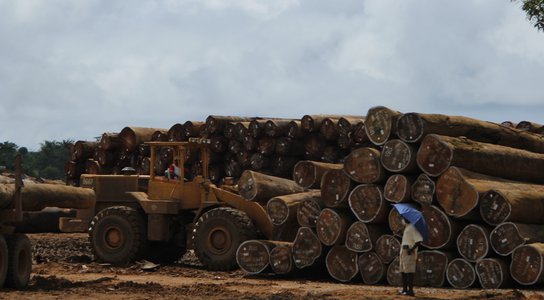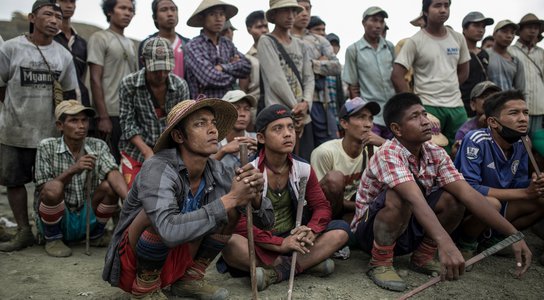Films have the power to inspire action, shed light on hidden stories and even change the world for the better. With the BAFTAs and Oscars coming soon, we asked Global Witness staff to nominate their favourite anti-corruption, human rights or environmental films.
If you want to protect our planet…
Virunga (2014)
Virunga is a beautiful and powerful documentary which brings together several compelling narratives: the terrible violence that has ravaged eastern Democratic Republic of Congo (DRC); the British oil company seeking to drill in the midst of the beauty of Africa’s oldest national park; the incredible young journalist on the case; and the tear-jerking relationship between a handler and his gorilla "family".
After the documentary was shot, non-governmental organisations including Global Witness, which had been following the case previously, were able to put intense pressure on the oil company, Soco International, to stop its activities inside the park. Our investigators uncovered further signs of corruption and human rights abuses and eventually the company left the DRC, leaving the park in peace.
Shortly after we discovered that the Ugandan government was about to issue an oil licence in the same area, putting the park at risk once again. We rallied our allies and fought a successful public campaign to stop oil companies bidding for the block. This wouldn't have been possible without the publicity the film achieved. The park is safe for now but oil companies are still opening up new oil reserves all along the Uganda/DRC border, putting many protected areas at risk.
George Boden, Campaign Leader, Industries Team, Land and Environmental Defenders
How to Change the World (2015)
This documentary is about a group of friends who set out to stop Richard Nixon's nuclear bomb tests in Alaska and end up founding Greenpeace. This was a real wake-up call on climate change, as well as an inspiring insight into the determination to change the world and the human fallibilities that get in the way. My friend Al Morrow was the producer on this so I followed the progress of production and heard some great stories about the characters involved.
Philippa Bogle, Legal Assistant
Gasland (2010) and Do the Math (2013)
My favourite environmental films are ones that aren’t just ends in themselves – they inspire action too. I saw Gasland, Josh Fox’s documentary about US fracking in a packed arts centre in Belfast, Northern Ireland, in 2011. After the film there was a discussion about upcoming plans to frack in Northern Ireland, and this led to a province-wide anti-fracking movement which ended in the practice being banned across all of Ireland a few short years later.
I like Do the Math for the same reason. Shown in thousands of community halls and living rooms, it’s helped the global fossil fuel divestment movement grow exponentially. Show this to a room of community activists and you’re well on their way to helping them take aim at their nearest divestment target.
Adam McGibbon, Climate Change Team
If you want to fight for human rights…
A Cambodian Spring (2016)
A Cambodian Spring is BAFTA-nominated – one of five contenders for the ‘outstanding directorial debut’ award. Filmmaker Chris Kelly spent several years with a community in Cambodia’s capital Phnom Penh, who were being forced out of their homes to make way for a luxury shopping complex. The film captures so powerfully the patterns of nepotism and human rights abuses that Global Witness has been documenting in Cambodia for decades – in this case the government hands a plot of land to a politically-connected businessman; thousands of people are evicted with nowhere else to go; and anyone who protests risks being beaten by police and locked up in jail.
Alice Harrison, Senior Campaigner, Land and Environmental Defenders
Baraka (1992)
The film has no conventional narrative but is a montage of fast-moving images from across the globe to capture what director Fricke calls ‘a guided mediation on humanity’. From a Balinese temple to a landfill in Calcutta, Angkor Wat to an industrial poultry farm, the film is a masterclass in juxtapositions, depicting the strength and fragility of our world; the significance yet ‘smallness’ of us as humans – it’s as if the pages of National Geographic have come alive on screen. Not a word is spoken in the film for an hour and a half. There’s no need. The images speak for themselves.
Ali Hines, Campaigner, Land and Environmental Defenders
If you want to expose corruption…
Spotlight (2015)
A
love letter to journalism, Spotlight
tells the true story of the Boston Globe
reporters who revealed the systemic cover-up of child abuse by the Catholic church
in Boston. This inspiring film highlights the importance of investigative
journalism and realistically dramatises the professionalism, patience and
diligence such work requires, as well as sensitively depicting the devastating
emotional fallout from abuse.
In an era of stifling accusations of fake news and moves to curtail press freedom, it is as important as ever for investigative journalists to continue to tell stories about abuse, corruption and exploitation.
Sarah Trentham, Visual designer
Inside Job (2010)
Inside Job is a critically acclaimed, Oscar-winning masterpiece of investigative documentary filmmaking. More than that, it is also the ultimate heist movie that explains how the vested interests that control our finance and politics caused the greatest recession in recent history and got away with it. Ten years later, this may seem like a distant memory, but the newly-elected US House of Representatives is finally poised to truly drain the swamp through an ambitious, sweeping package of anti-corruption reforms known as H.R.1 that is expected to pass later this month.
Zorka Milin, Senior Legal Advisor
Get Me Roger Stone (2017)
This film tells the story of the modern Republican party, how Trump came to power and his circle of cronies. Not only is it an incredible film but it provides a look into a side we aren’t always familiar with—it is historical in the sense that it attempts to explain ‘how we got here’ starting with the Nixon era and who the critical actors who have been calling the political shots. Manafort also plays a big role in it. So very pertinent given the times. It’s also conveniently on Netflix!
Alexandria Robins, Assistant Policy Advisor – Anti-Money Laundering
The Big Short (2015)
Fascinating insight into the 2007-2008 financial crisis based on the book by Michael Lewis. The film breaks down the chain of events which led to the catastrophic financial crash - the complex financial products contaminated with toxic debt, toothless regulators, conflict of interest in the ratings agencies, reckless bankers and the ultimate human cost to the poorest who lost their jobs and houses. It ends by ominously informing us that similar financial products are now on sale and none of the banks or individuals involved were ever held to account.
Jo Blackman, Forests Advocacy and Policy Team Leader
Vice (2018)
A fascinating insight into how warmonger Dick Cheney gathered more power than probably any Vice President in US history. It shows how he worked with the energy industry to influence appointments of vast oil fields in Iraq as the country was invaded by the US in 2003. My favourite thing about the film is how the actors cast play caricatures of their Hollywood typecast, to cleverly comment on the glamorisation of political figures on the Hollywood screen. Christian Bale, who plays Cheney, mimics his Batman voice; Steve Carell, playing Donald Rumsfeld, is as Carell as it gets; and Sam Rockwell shines in his Southern typecasting as George Bush Jr. A phenomenal must-see (though as with all Adam McKay, could be far more nuanced!).
Heather Iqbal, Senior Communications Advisor – Forests & Land
If you want to be inspired by amazing activists...
Dark Waters (2019)
Maybe inspiring isn't the right word for this film, which is based on the real-life story of Robert Bilott, a corporate defense attorney who takes on one of the world's most powerful chemical companies. The film follows Bilott's decision to take on DuPont after a visit from Wilbur Tennant, a farmer whose cows are facing inexplicable diseases and death. A decade-long journey ensues as Bilott uncovers DuPont's role in knowingly perpetuating the cancer-causing chemical PFOA, known as Teflon, and dumping its toxic sludge which contaminated the land and waters of this West Virginia town. This Erin Brokovich-esque film might leave you more outraged than inspired, but hopefully the tenacity of Bilott and the story of families like Wilbur (who had cancer and died of a heart attack) and his wife (who died of cancer), might infuriate you right into action.
Julieta Biegner, US Communications Officer
Nae Parsaran (2018)
In September 1973, the
democratically-elected government of Chile was overthrown in a coup, ushering
in decades of repression under Pinochet. In protest, Rolls-Royce workers in
Scotland refused to repair the engines of Chilean Hawker Hunter jets, letting them
rust. They never found out about the impact they had on the Chilean regime –
until last year when Nae Pasaran was filmed. It was far bigger than they ever
could have imagined.
Nae Pasaran is an uplifting reminder that standing up for others, no matter who small the act seems, no matter how far away they are, can have a huge impact. And it might just make you cry too.
Adam McGibbon, Senior Campaigner, Climate Team
How to Start a Revolution (2011)
You may not have heard
of Gene Sharp but you will have seen the activists he inspired to take action –
in Serbia, Ukraine, Egypt, Syria and many other struggles over recent decades.
He is the guru of non-violent resistance, unpicking the balance of power in
societies, showing how to use your power against those who would exploit theirs
malignly. The stirring, award-winning documentary How to Start a Revolution, made by Ruaridh Arrow, explores Gene’s
inspiration, ideas and influence.
Gene Sharp is in the lineage of non-violent
resistance of Gandhi, Martin Luther King Jr, and more recently the rising
climate emergency actions by Greenpeace, the Lancashire Nanas, the Standing Rock protests, Greta Thunberg and the school climate strikes, and Extinction Rebellion. He was nominated for the Nobel Peace Prize
several times, but was no red carpet sniffer, preferring instead to work
diligently from Boston where he founded the Albert Einstein Institution. His house became an essential stop for changemakers from around the
world who wanted to tap into decades of learning and thinking about bringing
about social justice and revolution using non-violent methods.
If you’re inspired by the film take a look at Gene’s list of 198 Methods of Nonviolent Action, a toppling tyranny to-do list for a fairer, happier, greener world. Much of his work, including probably his most famous book From Dictatorship to Democracy, is available online. Gene Sharp died in 2018, but this film shows how the seeds he planted continue to spread and grow. His philosophy is as relevant today as when he first formulated it, and can be adapted in squillions of ways for today’s networked world. Stay Sharp.
Simon Clydesdale, Campaign Leader, Oil, Gas and Mining Team
The Great Hack (2019)
BAFTA-nominated The Great Hack looks into The Cambridge Analytica scandal and is an ode just how important investigative journalism is to exposing such scandals. If you want to know how your data can be used, sold and manipulated for governments’ and companies’ own agendas, then watch this film. Told through the narrative of one man’s quest to retrieve his data, mixed in with compelling visuals, this film is a fantastic – and very alarming - insight into the dark world of data.
Jasmin Qureshi, Multimedia Manager
Cover image photo credit: Still from Virunga, dir. Orlando von Einsiedel (2014)


